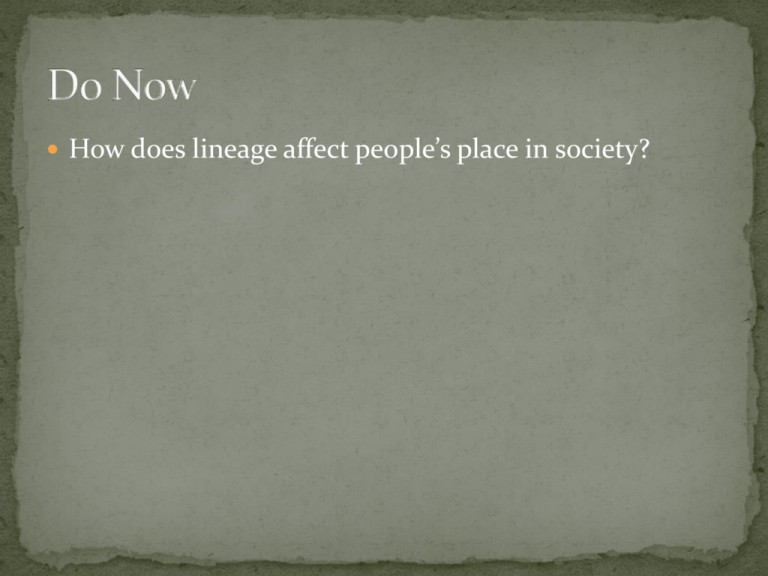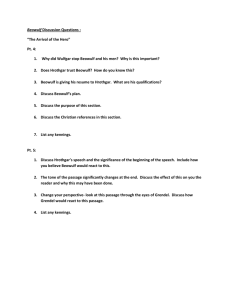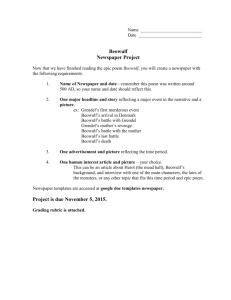Beowulf PPT
advertisement

How does lineage affect people’s place in society? Epic – a long narrative poem, sometimes developed orally, that celebrates the deeds of a legendary or heroic figure Legendary hero – larger than life character whose accomplishments are celebrated in traditional tales Boastful self-confidence Feats of strength Victories in battle Beowulf – Geat Hrothgar – Dane The clergy was the first group to record the story of Beowulf. At the time Beowulf was recorded, Christianity was spreading through Europe. Elements of the story are indicative of the struggle between paganism and Christianity that was occurring at the time. Beowulf Christ-like figure Grendel’s mother Biblical portrayals of women What does the story of Grendel’s origins suggest about the beliefs of Anglo-Saxon culture? Terrorized by Grendel, Hrothgar and his followers face “Twelve winters of grief.” How does the length of their suffering increase the epic feelings of this tale? How do word choice and stylistic features of the watchman’s speech add a serious epic tone to his question? (Page 43) How do Beowulf’s boasts of great deeds and his announcement of his plan establish him as a hero? How do the “renamings” of Grendel in Line 325 emphasize the significance of the battle that is about to begin? Which details from the description of the battle between Beowulf and Grendel add realism? Which details add epic grandness? (Page 48) How does Beowulf’s battle with Grendel end? Based on your reading of Beowulf, how do the Anglo-Saxons define a hero? How do we currently define a hero? How do you account for any contrasts between your answers to the questions above? Examine the role of religion in the story. Look for examples of conflict between Christianity and paganism. Grendel “bewitched” Beowulf’s warriors’ weapons Beowulf believes that fate will decide whether he lives or dies Page 52, lines 530-535-These lines underscore the pagan-Christian blend in the poem. The Christian God is said to give Beowulf victory Sword was “blessed” with the magic of giants. Lines 579-580 show another example of the blending between the two beliefs. During the battle, what realization does Grendel have about his adversary? How does Beowulf’s battle with Grendel end? To Beowulf, what is more important than victory? What does Beowulf ask of Hrothgar before he enters into battle with Grendel’s mother? Where does the battle with Grendel’s mother occur? How does this battle differ from others that Beowulf has encountered? What happens once Grendel’s mother falls to the ground? What does this signify? Look for descriptions of Grendel’s mother in the story. Take note of how she is portrayed and how her portrayal is stereotypical of women in literature. How does the setting of the battle add to its epic significance? Consider what it shows about the realms in which Beowulf has power. How is Grendel’s mother described in these sections? How does this fit in with stereotypes of women that you have previously encountered in literature? Fierce and protective Nameless women Biblical portrayals of women Perfect and angelic Protective as a mother Temptresses and prostitutes Eve The Battle with Grendel’s mother takes place under water, in an obviously mythical setting. Beowulf destroys evil which is signified by the bright light. Beowulf returns with Grendel’s head and the hilt of the giants’ sword. A legendary hero is a larger-than-life character whose accomplishments are celebrated in traditional tales. In order for a story to be an Epic Poem it must meet certain criteria. It is a long narrative poem. Sometimes developed orally. The poem begins in medias res – in the middle. There are events that are already in motion. The epic hero is from a noble family. The hero has characteristics like bravery, honesty, loyalty, all of which are important to that society. The hero performs powerful and supernatural acts. The actions of the hero save the society. There is more than one setting or nation involved. The theme of the story is good vs. evil. There are long, formal speeches. There are supernatural beings to battle that threaten the order of his world. Beowulf, the epic of the Anglo-Saxons, uses elements of Anglo-Saxon poetry such as the kenning and caesura. Read The Last Battle, The Spoils, and The Farewell, pages 54-60, and answer corresponding questions. According to Wiglaf, what is Beowulf’s relationship with his followers like? What does Wiglaf’s decision suggest about the way in which a legendary hero can inspire heroism in others? In Beowulf’s death scene, what is shown about the importance in warrior culture of the commem0ration of individuals after death? What are the possible benefits and disadvantages of living a solitary life? What are the possible benefits and disadvantages of living a solitary life? Many critics have seen the poem as a Christian allegory. Examples of fighting alone in poem Identify an example in the poem in which Beowulf’s deeds inspires someone. Explain how the poem, by keeping Beowulf’s memory alive, keeps a culture’s values alive. Look for connections between Beowulf and other solitary figures in history and literature. In a short speech, justify why it was or was not necessary for Beowulf to be a lonely character in order to be successful.






